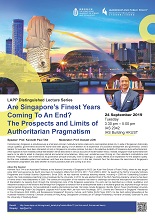****Registration for the seminar has been closed because we have reached the maximum number of registrations for the event. Thank you for your interest!****
Contemporary Singapore is simultaneously a small post-colonial, multicultural nation-state and a cosmopolitan global city. In spite of Singapore's historically unique qualities, governments around the world have been paying a lot of attention to its experience of successful development and governance. China’s leaders, for example, have been interested not only in Singapore’s innovative policies, but also in the adaptive durability of Singapore-style authoritarianism, which appears to have resisted political liberalisation trends described in various accounts of modernisation theory. Instead, Singapore-style authoritarianism seems to be able to adapt to changing internal and external circumstances, tiding over, sometimes even thriving on, their attendant contradictions and tensions. Pragmatism, now enshrined as its governance principle (ironically, even its ideology), is usually offered as an explanation for this adaptive quality. But the once malleable system has hardened, and there are obvious cracks in it. In this talk, Kenneth Paul Tan discusses the near-future of Singapore’s authoritarian pragmatism and asks whether its most successful years are coming to an end.
About the Speaker

Professor Kenneth Paul TAN
Professor Kenneth Paul TAN is an Associate Professor at the National University of Singapore’s (NUS) Lee Kuan Yew School of Public Policy, where he has taught since 2007 and served as its fourth Vice Dean for Academic Affairs from 2013 to 2017. From 2000 to 2007, he taught at the NUS’s University Scholars Programme and Political Science Department. Since 2000, he has received numerous teaching awards, including in 2009 the Outstanding Educator Award, the most prestigious teaching honour bestowed by the University. In 2012, he was elected Chair of the NUS Teaching Academy, where he has been a Fellow since it was established in 2009. The central pre-occupation of his research has been to challenge conventional theorizations and formulations of liberalization by passing them through the contemporary lens of the Singapore experience. His work can be described as a critical, qualitative, and interpretive analysis of the tensions that emerge from Singapore’s transition from a developmental state to a neoliberal global city, explored through various interconnected dimensions. He has published in leading international journals. His books include Singapore: Identity, Brand, Power (Cambridge University Press), Governing Global-City Singapore: Legacies And Futures After Lee Kuan Yew (Routledge, 2017), Cinema and Television in Singapore: Resistance in One Dimension (Brill, 2008), and Renaissance Singapore? Economy, Culture, and Politics (NUS Press, 2007). He has held visiting fellowships at the Australian National University, Chinese University of Hong Kong, Georgetown University (on a Fulbright Fellowship), Harvard University, Sciences Po, and the University of Duisburg-Essen.
Related Information

**FREE ADMISSION
Refreshment will be served at 15:15.
Seats are based on a first-enrolled, first-served basis.
